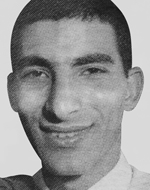Son of Amneh and Muhammad. He was born on 28.4.1973 in Old Acre. A brother to ten brothers and sisters. Khalil grew up in Akko, the son of a well-known Bedouin family in Acre, the only Bedouin family in the city. He studied in the city’s education system until his high school graduation. Khalil loved the sea and at an early age engaged in fishing and helped support the family. On August 15, 1993, Khalil volunteered for military service as a tracker, although the family did not have to enlist, and he and his four brothers volunteered for military service, with the support of the parents Muhammad and Amna, who see them as proud of the family. Khalil’s father told of his son: “He wanted to serve in the army because he felt he was a citizen of this country. All his brothers serve in the army because this is their country, and when they go in any way, they go all the way. “Khalil was very fond of his friends and commanders, and after completing his compulsory service, he volunteered for a career in the Northern Command and was stationed in southern Lebanon. “In 1997, Khalil married his son Anam, and about a year and a half later, his eldest son Fares was born, and his wife and son moved to live in Lebanon. In their new apartment in the mixed neighborhood of Acre a few months before his fall.In May 2000, Khalil was stationed in the Northern Scouts unit and served In the outposts on Mount Dov. On the morning of November 26, at around 7 PM, during the opening of an axis between the Dalia outpost and the Hadas outpost in the Mount Dov area, Khalil noticed through the binoculars a suspicious object placed about nine hundred meters south of the international border, inside Israel. He went in front of the three armored vehicles with another soldier and the dog of the dog handler, who specializes in identifying charges. The sector was difficult and complicated, and the soldiers approached to check the suspect’s place, and then a powerful explosive device was discovered. Before the force managed to neutralize it, the bomb exploded, killing Khalil on the spot and injuring two other soldiers from Battalion 202 of the Paratroopers Brigade: the soldier who went alongside Khalil and the driver of the first armored vehicle. The bomb was detonated by a remote operation, apparently from the Hezbollah position overlooking the road. Sergeant Khalil Muhammad Taher fell in operational activity on Mt. Dov on November 26, 2000, and he is twenty-seven years old when he fell. He was buried the next day in the Muslim cemetery in Acre. Khalil left behind a pregnant wife, a child of one and two months, parents, and ten brothers and sisters. The local imam of the Al-Jazzar Mosque in Acre refused to bury him for ideological reasons, because Khalil served in the IDF and was replaced by an imam from the nearby village, Khalil’s relative, who followed the law. Foreign affairs and security, so that an imam will be appointed in the IDF and will deal with the religious needs of Muslim soldiers. After the charge was detonated, the other soldiers opened fire on the Lebanese side of the border, and an artillery battalion stationed in the Mount Dov area began shelling Hezbollah positions. In response to the killing of Sergeant Khalil Taher, and for the first time since the IDF withdrew from Lebanon, the IAF struck terrorist targets on the same day, and Khalil was the first soldier killed on the northern border after the IDF withdrew from Lebanon in May 2000. He served in the IDF as a tracker for eight years, during the last three years he was stationed on the Lebanese border, and Khalil’s brother Ahmad, Mahmoud, Omar, and Salah promised to continue their military service and thus Khalil’s path. Of the residents of Old Acre object to the service of the Bedouin family in the IDF and even harass them, but the family members see it as their duty to serve the country in which they live: “We will continue and even better serve, no one will break us,” he added. In 2001, Khalil’s father received a certificate of appreciation and appreciation from Major General Gabi Ashkenazi for the contribution and work of Khalil during his service in the Northern Command
